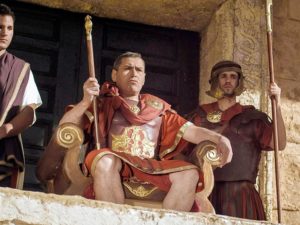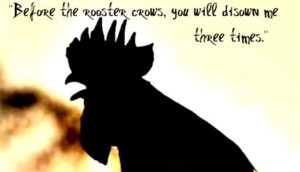Pilate then called together the chief priests and the rulers and the people, and said to them, “You brought me this man as one who misleading the people. And after examining him before you, I didn’t find this man guilty of any of your charges against him . . . “ Luke 23:13-14
With a snap of his fingers, he stages the scene: soldiers hustle the purple-clad “king” out to the portico where Pilate returns to his judge’s chair and faces down the priestly delegation. They form a rough triangle on the pavement: judge, accuser, accused. Beyond them, separated by a leather curtain, is the open courtyard.
“You charge this man with insurrection,” Pilate says, “but after examining him I deem the charge to be baseless. Antipas agrees: this man has done nothing to deserve death. Therefore it is my judgment that he be flogged for the trouble he has caused you and then released. For–”
The noise stops him. On the other side of the curtain a crowd is gathering and voices are beginning to come together.
With a sinking heart, Pilate realizes he’s been outmaneuvered. The Jews have been busy while he was distracted, sweeping up the dregs of the city—peasants and ne’er-do-wells—and seeding them with shills. In the general clash of voices a broken rhythm begins: a chant here and there, a confused tumble of words, rolling from one end of the courtyard to another. From experience, he knows the words will come together like the pieces of a mythical monster—
The crowd is becoming a mob.
The power of Rome has his back in everything, except this. His job is to keep the peace at almost any price. Mobs lead to protest and protest to bloodshed, and bloodshed to full-scale rebellion. He has scarcely recovered from the unfortunate incident with the slaughtered Galileans,* and now this. The random chants that reach his ears are beginning to take shape:
“Away with him! Away with him!”
The faces of the priests and Pharisees are bland as cream.
“You know,” says Pilate, grasping at straws, “that at every feast I can release any prisoner I choose. I choose to release this man.”
But they have anticipated this too. Even now, voices are crying out, “Give us Barabbas! Give us Barabbas!”
“Barabbas?” he demands of the Jews. You’d rather set a rebel and murderer loose among you than this man, who has done no harm?”
They only shrug: who are we to resist the people’s will?
Heaving a giant sigh, Pilate stands up and marches past the curtains. The Jew s have done their work well—restless bands fill the courtyard, more coming all the time. He puts on a brave show: stands up tall, adjusts his toga and band of office, pitches his voice above the din.
s have done their work well—restless bands fill the courtyard, more coming all the time. He puts on a brave show: stands up tall, adjusts his toga and band of office, pitches his voice above the din.
“I find no fault in this man! Therefore, he will be flogged and then–”
Another chant is beginning, an undercurrent snaking through the voices, roping them in, tying them together:
Crucify!
*Luke 13:1
________________________________________________
For the original post in this series, go here.
Next>




